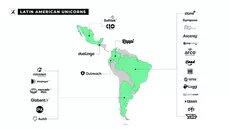
In the third part of the TUM São Paulo Insights series, Liaison Officer Sören Metz gives an insight into the Unicorn club in Latin America. As mentioned in previous Insights, the financing opportunities for start-ups in the region have improved noticeably in recent years. This is also reflected in the number of Unicorns, which has been growing exponentially since 2017.
Unicorns are start-ups that are valued at more than one billion dollars. While in 2017 there were only two solitary unicorns in Latin America, only one and a half years later they had already grown to a herd of a proud 14. In 2020, the region has already 25 Unicorns. This massive increase in highly rated companies could lead Latin America out of its recent slump in economic growth: an opportunity that could open up new avenues, especially in times of the corona pandemic.

Brazil and Argentina are leading in the region
According to a survey by the Latin American Private Equity and Venture Capital Association (LAVCA), the capital financing of start-ups on the continent in 2016 amounted around USD 500 million. By 2018, this figure had already risen to two billion US dollars, and in 2019 the year ended with over four billion dollars in financing rounds. This means that the volume of venture capital in the region has grown eightfold in just four years. Most of the Latin American Unicorn start-ups can be found in Brazil (fourteen) and Argentina (six). The Unicorns here operate primarily in the financial services, transportation, insurance and real estate sectors.
Financial sector as central Unicorn hotspot
The financial sector with its traditionally oligopolistic markets in the region is particularly interesting for innovative start-ups. Brazil's Unicorn Nubank, for example, has transformed the market with free credit cards. Similar to other markets in Latin America, access to credit cards was previously regulated exclusively by the issuing banks.
The two Argentinean sales portals OLX and mercado libre are active throughout Latin America. mercado libre has also entered the financial sector, offering credit cards and payment options via QR codes. Mercado libre is the Latin American counterpart to Ebay and also offers its own logistics services and financial products.

Universities as birthplace of Unicorns
Similar to TUM, universities in Latin America are also the starting point for extraordinary start-ups. At the University of São Paulo (USP), for example, the founders of four Brazilian Unicorns studied; among others, Cristina Junqueira, co-founder of Nubank. She studied industrial engineering and management at USP.
Nubank – figurehead of Latin American start-ups
Since the start-up was founded in December 2013, Nubank has revolutionized the Brazilian credit card market and is now also entering the current accounts and investments sector.
Cristina Junqueira has had two children in addition to founding Nubank and was the first Brazilian top manager to be photographed in advanced pregnancy for the Forbes cover - three days before the birth of her second daughter. Together with her co-founder, Colombian David Velez, she has set Nubank on the road to expansion: an office has already been opened in Mexico and IT specialists and engineers are working in Berlin to further develop the digital bank.
Innovations for the real estate market and education
QuintoAndar, on the other hand, has specialized in the Brazilian real estate market, especially the rental market, and with an automatic rental security system has made renting much easier.

Previously, tenants needed a guarantor or rental insurance, which was perceived as difficult and cumbersome. Through the automated rental security system, credit and other financial data is requested directly from the potential tenants and QuintoAndar bears the risk towards the landlord. The start-up earns money with a monthly charge on the rent paid.
Start-ups from the education sector are also among the Latin American Unicorns: The Guatemalan DuoLingo, for example, has created one of the most successful applications in Central America with its language learning app.
German Start-ups and Latin America
German start-ups have also discovered Latin America for themselves. The new DAX company Delivery Hero has taken over the Central American units of the delivery company Glovo and is trying to gain a foothold in the highly competitive market. In addition to Delivery Hero, the Colombian startup Rappi and the Brazilian start-up iFood have good chances of gaining a foothold in this market in the long term. The German-British start-up SUMUP is also active in Brazil and offers payment solutions with its own terminals, especially for retailers - even the coconut on the beach in Rio can be paid by credit card. Founded in Berlin in 2012, the start-up came to Brazil in 2013 and has also been active in the Colombian market for a year now.
The Latin American market naturally offers interesting opportunities for TUM start-ups to become active. Feel free to contact TUM São Paulo Liaison Officer Sören Metz at any time to discuss your ideas.
Sources:
- QuintoAndar – success case: https://www.consumidormoderno.com.br/2019/12/16/5-fatores-que-fizeram-do-quintoandar-um-case-de-sucesso/
- Nubank – success story: https://techcrunch.com/2020/03/03/valued-at-10b-nubank-launches-its-nu-credit-card-in-mexico/
- Forbes Cover: https://forbes.com.br/colunas/2020/06/capa-historica-imagem-de-cristina-junqueira-a-tres-dias-de-dar-a-luz-teve-ampla-repercussao/
- SUMUP Brazil launch in 2013: https://sumup.co.uk/press/sumup-expands-to-latin-america-with-launch-in-brazil/